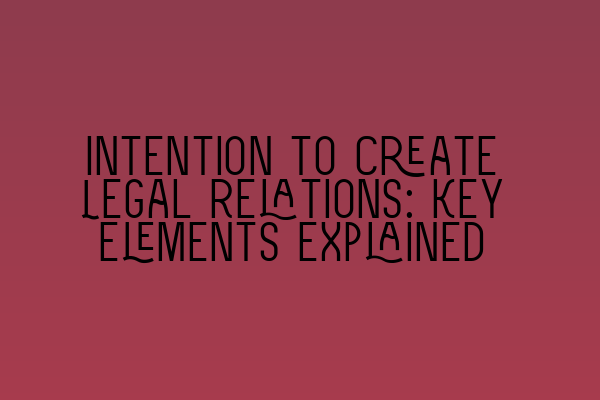Intention to Create Legal Relations: Key Elements Explained
As a solicitor, understanding the concept of intention to create legal relations is crucial in contract law. This principle determines whether a legally binding agreement exists between parties involved in a transaction. In this blog post, we will explore the key elements of intention to create legal relations, providing you with a comprehensive understanding of its importance in contract law.
What is Intention to Create Legal Relations?
Intention to create legal relations refers to the intention of parties involved in a contract to be legally bound by its terms. In simpler terms, it determines whether the parties intended to enter into a legally binding agreement or were merely engaging in casual conversations or social arrangements.
For a contract to be legally enforceable, there must be a clear intention on the part of the parties to create a legal relationship. This intention is assessed objectively, based on the reasonable person’s perspective.
Express Intention
An express intention to create legal relations exists when the parties explicitly state their intention to be bound by the terms of the agreement. This can be in the form of a written contract, where the parties clearly state their intention to create a legally enforceable agreement.
However, it’s important to note that the absence of a written contract does not necessarily mean that there is no intention to create legal relations. Contracts can also be formed orally or through the conduct of the parties.
Express intention is often found in commercial agreements, employment contracts, and business transactions where the parties’ intention to be legally bound is evident.
Implied Intention
Implied intention to create legal relations, on the other hand, is determined through the conduct of the parties and the nature of the relationship. In certain circumstances, the courts may infer that the parties intended to create a legally binding agreement based on the conduct and surrounding circumstances.
An example of implied intention can be seen in contracts between friends or family members. If a family member offers to pay for another family member’s education or expenses, the courts may infer that there is an intention to create a legally binding agreement, even in the absence of a written contract.
Similarly, in commercial relationships, the courts may imply an intention to create legal relations based on the parties’ behavior and the nature of the transaction.
Factors Influencing Intention to Create Legal Relations
While assessing the intention to create legal relations, the courts consider various factors, including:
- The nature of the agreement: Is it a commercial transaction or a social arrangement?
- The involvement of lawyers: Did the parties seek legal advice or prepare a formal contract?
- The clarity of the terms: Were the terms of the agreement sufficiently clear and specific?
- The presence of consideration: Did both parties provide something of value in exchange for the agreement?
- The parties’ behavior and conduct: Did their behavior indicate an intention to be bound by the terms?
These factors help the courts determine whether an intention to create legal relations exists and whether a contract can be enforced.
Conclusion
Intention to create legal relations is a fundamental principle in contract law. Whether through express or implied intention, parties must demonstrate their intention to be legally bound by the terms of the agreement. Understanding the key elements of intention to create legal relations is essential for solicitors and legal professionals involved in contract law cases.
If you would like to practice SQE 1 exam questions or need mock exams for preparation, please visit SQE 1 Practice Exam Questions and SQE 1 Practice Mocks FLK1 FLK2. Additionally, if you are looking for SQE 2 preparation courses or SQE 1 preparation courses, we have comprehensive courses available to help you succeed. To stay updated on the latest SRA SQE exam dates, visit SRA SQE Exam Dates.
